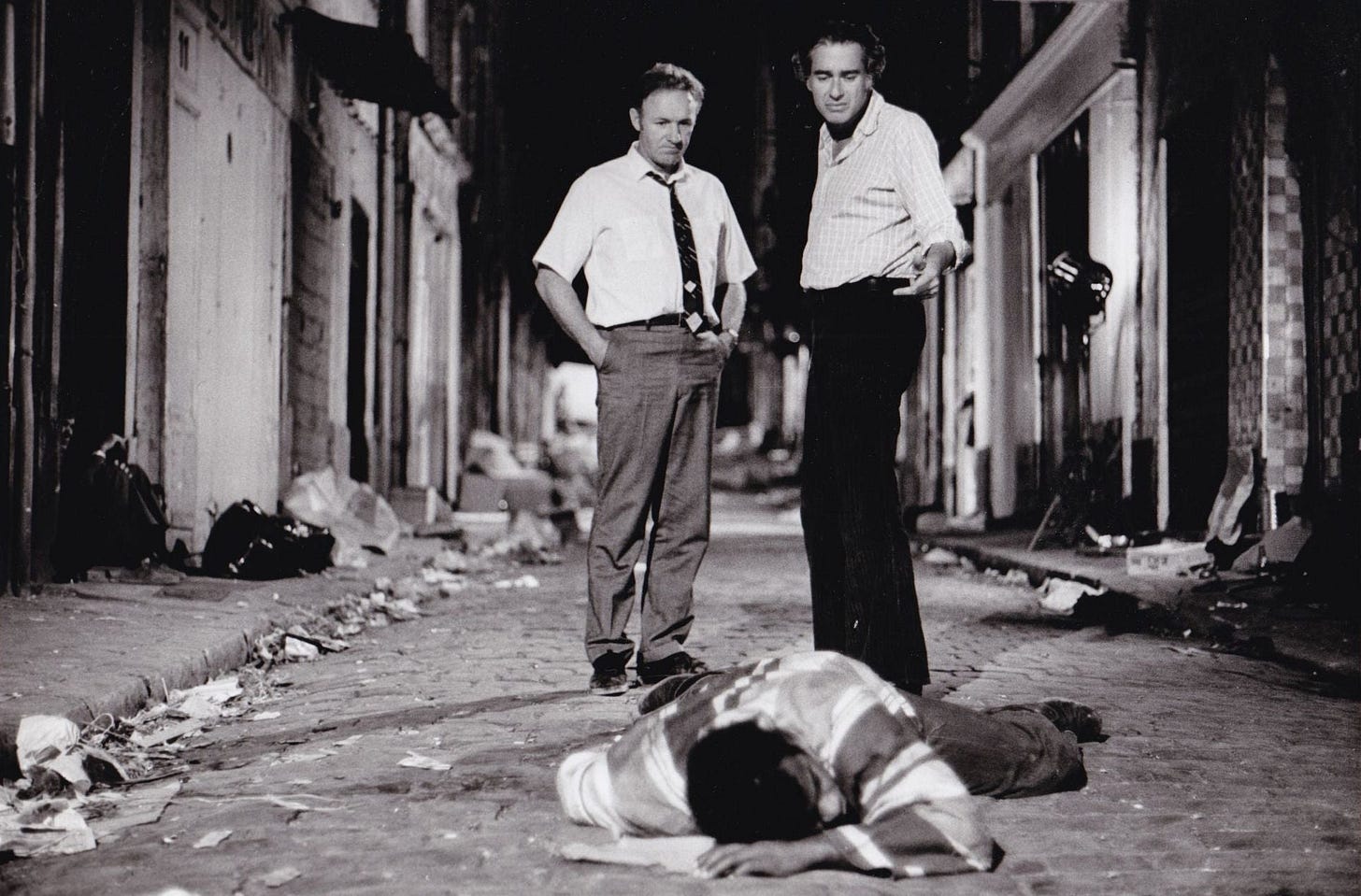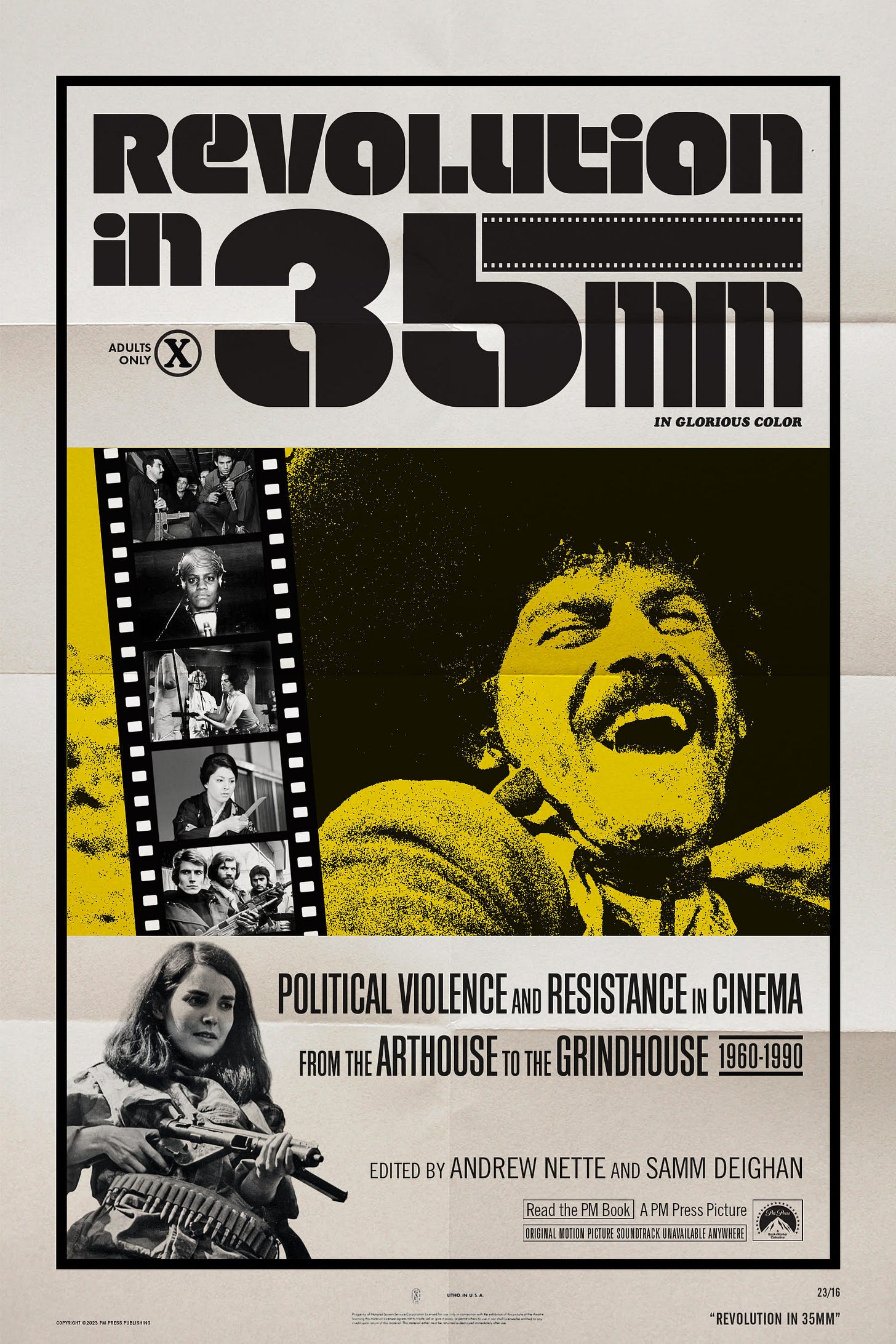In Praise of French Connection II
Can we talk for a moment about just how good John Frankenheimer’s 1975 movie French Connection II is?
The film - fifty years old this week - did okay but not spectacular business on release and I would argue has never received much love from critics and crime film fans alike, for a number of reasons.
First, it is a sequel and with few exceptions, like oft cited The Godfather II (1974), we are always pretty meh about sequels. And for the most part, rightly so.
Second, is the shadow of the 1971 original. The French Connection (which I wrote about here for the US site CrimeReads on the occasion of its 50th anniversary) won a tonne of Oscars, including best picture, best actor for the late Gene Hackman as Detective Jimmy ‘Popeye’ Doyle, and best director for the then wunderkind, William Friedkin, and is one of the most famous American crime films of the 1970s.
Third, is the director, John Frankenheimer. He started his career with a streak of highly acclaimed and incredible films, The Manchurian Candidate (1962), Seven Days In May and The Train (1964 ), and Seconds (1966). But after the 1960s his filmography is often seen as having lost steam, although he continued to do some great work: 52 Pick-Up (1986), the nasty little film he did for Cannon, the virtually unknown but quite good Dead Bang (1986), and Ronin (1998), just to name a few. The 1970s are often viewed as a particularly fallow period for him, although smack bang in the middle of it came French Connection II.
I watched French Connection II maybe twenty five years ago and came away pretty unimpressed. But this has changed with subsequent rewatches.
Hackman almost passed on reprising the role of Popeye Doyle because he felt that not enough time had passed since the original had hit the screen. Thank Christ he didn’t because he is just as good the second time around. The film sees his character Doyle turn up in the gritty French port city of Marseilles. He has presumably spent the time since chasing down information about the French heroin trafficker Alain Charnier, aka ‘Frog One’ (Fernando Rey), who only just escaped capture at the end of the first film. The French police, particularly Doyle’s main police liaison, Barthelemy (Bernard Fresson) are rude and standoffish, give him a desk next to the toilet and tell him to his face that he is not wanted and should go home.
Barthelemy is particularly wary of Doyle for his role in killing other police (correct me if I am wrong, but the first installment starts with Doyle being under a cloud for the death of a cop and ends the film killing another cop in a fire fight). And true to form, when the American accompanies the French police on a routine drug bust, Doyle ends up nearly getting an undercover police operative killed.
Given the cold shoulder by his French counterparts, Doyle is left to his own devices to wander around Marseilles. Cue various instances of full-on cultural insensitivity as the hard drinking, racist New York cop tries to make himself understood in the rough and tumble port city (French Connection II would make a great double feature with Ridley Scott’s 1989 film, Black Rain, starring Michael Douglas, on the theme of loose canon, alcoholic, dirtbag American cops cut adrift in foreign cities).
What Doyle doesn’t know, but we do via a phone call we view Barthelemy having with Popeye’s New York superiors, is that Doyle has been sent over as bait to flush out Charnier. Indeed, before long, the heroin trafficker has picked up Doyle, stashed him to a decrepit hotel in the city’s old quarter, and has his men inject him with enough heroin to addict him in an effort to loosen his tongue and find out what he knows.
Content that the American doesn’t have any information of value, and with Doyle now a babbling junkie, Charnier has his men dump the New Yorker cop from a moving car in front of police headquarters. Going outside normal reporting channels, Barthelemy locks Doyle in a room in the basement of the headquarters and makes him go cold turkey, an extended scene in which Hackman does a lot of shouting and threshing about.
When I first talked about this film on social media, a lot of people commented that this scene went too long, but I think it is essential to the film’s power. Seriously, you don’t kick a heroin habit, even a new one, in a matter of minutes. Also, how many major crime films, even in the 1970s, the era of the tough US crime film, turn the major talent into a gibberish sprouting heroin addict and then make him go cold turkey on the screen? Can you image Pitt or Clooney taking on such a role? Not on your life.
Doyle eventually recovers and sets about locating the hotel he was held in. He burns it to the ground as the first stage of relentlessly pulling apart Charnier’s organisation and getting his revenge of the drug trafficker, which he does at the end of the film. For those if your who have not seen French Connection II, I won’t spoil it suffice to say the scene concerned is as forceful as it is brief.
The depiction of Marseilles, by the way, is another of the film’s highlights. Frankenheimer had been living in France for a number of years and was fluent in French when he agreed to make French Connection II, and his familiarity with the terrain and culture pays off big time.
All this is a very roundabout way of saying French Connection II is a neo noir tour de force and it is high time it got the recognition it deserves.
Revolution in 35mm: Political Violence and Resistance in Cinema from the Arthouse to the Grindhouse, 1960-1990
My latest book, co-edited with Samm Deighan, Revolution in 35mm: Political Violence and Resistance in Cinema from the Arthouse to the Grindhouse, 1960-1990, is available from online and physical book shops. You can also pick it up as a physical and ebook from the publisher, PM Press, at this link here.





Yes, it's a great film. I have never forgotten the cold turkey scene, and that he burns the hotel down in revenge. Both scenes shocked me. And the grittiness of Marseille is impressive. Definitely one for the rewatch list. Like the Black Rain comparison.
Hackman's Dolye is so unlikeable. And he plays him with relish. For me it's at least the equal of Part 1.